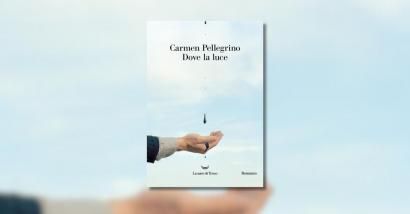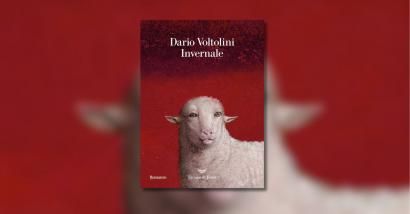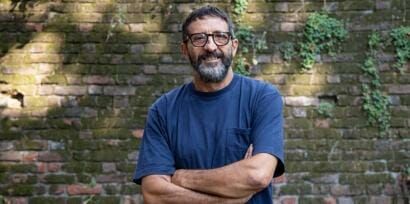“What do they know aboutcarnal love those for whom life is light, and love only a tender and guilty pastime? But those who are crushed by life: the defeated, the dishonored, the miserable… these can say how good the flesh of a woman is! In this flesh, from which they had life and on which they huddled as children, they still find refuge”, says the mysterious protagonist of Here the path gets lost (Adelphi, translation by Daniele Petruccioli) by Antoinette Peske And Pierre Marty when, during his long and very tormented journey betweenCentral Asia and the Siberia wonders about the furiously erotic relationshipbetween exaltation, violence, tenderness, with a charming gypsy who chose him among many, seeing something unique and special in him, who knows, perhaps recognizing him?
The wandererin the moment of love with this, a little disturbing, Maluzia who knows how to provoke him “an infernal enjoyment” and pushes him to kill to regain freedom, he is in conditions of slavery in Samarkand. And he’s not just any tramp, but lo Tsar Alexander Ifirst enlightened and then reactionary autocrat, who faked his own death to undertake a sort of interminable initiatory itinerary, and not only, within the perimeter of his already vast empire; as if to chase the truth and the nudity of the human.
It may also interest you

There are some abrupt moments in the various sections of the novel changes of the point of view, which could also suggest a different reading: not just one character, but two or three personifications of it. However, the substance does not change. About the Tsar he defeated Napoleon and invented the Holy alliance in fact there is a solid legend, which spread in Russia starting from 1825, the official year of the sovereign’s death, and which the ruling house tried in vain to counteract also with periodic exhumations of the body; which some historians also believe in and which above all was of interest Leo Tolstoy inducing him, after having investigated the story of a former deportee to Siberia who had become a sort of popular saint, to recognize in him the sovereign who disappeared in Posthumous memoirs of starets Fyodor Kuzmič. It is a story written at the beginning of the twentieth century and then released in 1912, after his death.
Antoinette Peské and Pierre Marty, husband and wife who have also signed two other novels together with this transparent pseudonymthey have certainly taken this into account, however, skillfully expanding and complicating the historical or legendary inspiration in a great adventurous saga, a book where the adventure is tinged with mysticism, religions, oriental philosophy, Buddhism, esoteric taste, with a spirit and sensitivity at all twentieth century – it’s a lot French.
When it came out, in 1955it came beautifully ignoredperhaps because of its cut it anticipated the imminent postmodernism. Re-proposed thirty years later again in France, it is now in the Adelphi Library (will he be able, as has often happened, to “resurrect” a forgotten book and make it a success?): with the French preface of the time, which in truth limits itself to evoking the image of a “western novel” comparing the immense East between Asia and Siberia to the wild American West as frontier lands where anything can happen.
It may also interest you

It is certainly not a senseless suggestion, but very partial, because Alessandro’s great adventure is not only punctuated by material events and traumatic struggles (slavery, violence, murder, love – even homosexual – wanderings through forests and wild mountains, expanses of snow, the fury of the elements, the fight for survival, horses, gold diggers , the encounters with distant peoples including Mongols, Tajiks, Uzbeks, even Chinese, forced laborers and bandits, fugitives and the homeless) but it also has a plot that could be defined as spiritual. The pilgrim tsar is attracted by the wisdom of the Easttowards which he also has a great deal distrust.
At a certain point in the journey he comes to wonder if the “disappointed Westerners” who, “expecting who knows what revelation, interrogate that legendary country, the unknown peoples of the East, bearers, it is believed, of the mysterious seed from which the golden age will rise again” do not realize how the orientals are “alas , just further along in the rot than the West.” At a decisive turning point, towards the end, he not only learns from a Lamaappreciating them, the doctrines of the Buddhabut he learns to perform terrible Tibetan rituals and indeed evoke demons, while between dream and reality the “God is dead” of a Nietzsche yet to come; and also the words of a Muslim sage who told him: the God to whom you return is nothingness.
It may also interest you

It must be said that too much attention to philosophical scaffolding and its derivations somewhat marked by the esoteric clichés of the twentieth century, however, risk doing injustice to the true charm in this atypical book and a little scandalouswhich is that ofadventureof a fast-paced, sometimes messy narrative, sometimes wild and – even rhetorically – popular, even overexcited; one would say Salgarian, among philosophical count And feuilleton.
The French preface of the 1985 edition compares it to a nineteenth-century book by an unknown author, The life of a pilgrimbut also for those who have not particularly studied Russian literature, as they gradually delve into it Here the path ends many pages and even certain specific episodes seem to irresistibly evoke a wonderful classic like The enchanted traveler by Nicolaj Leskov (both texts are available among other things in beautiful Adelphian editions): where a monk narrates, during a crossing of Lake Ladoga (near the border with Finland), his incredible exploits as an adventurer in Central Asia, also in this case between rustic duels, horses, fascinating and disturbing gypsies, not to mention the murders.
Discover our Telegram channel
The tone, however, is that of a cheerful braggart, which can be believed or not believed. Nothing picaresque, however, in Alessandro di Peske-Martin, which also becomes part, passing through the Seine, of the world of enchanted travelers – not necessarily Russian. The authors, who must have had, if not direct experience, a good knowledge of the Siberian and Mongolian landscape, of the Asian kingdoms later incorporated into the Tsarist empire (and a family memory: Antoinette Peske she was the daughter of two Russian artists who emigrated to Paris), they had a destiny literary so far rather miserly. Pierre Marty was not a man of letters or a public intellectual but a jurist, passionate about oriental philosophies.
Antoinette Peské enjoyed just a little more luck, making her debut as a poet appreciated for example by Guillaume Apollinaire. And if his novels, The indescribable rival (1924), The box en os (1941, translated for Irradiazioni in 2010) did indeed receive some attention – it was compared, for example, to Emily Bronte -, however, she remained a niche author.
After her husband’s death she wrote nothing more, died in 1985. Le Monde of October 10 dedicated a dutiful obituary to her, but in sharing: in the same article ours was also remembered Richard Bacchelli.










